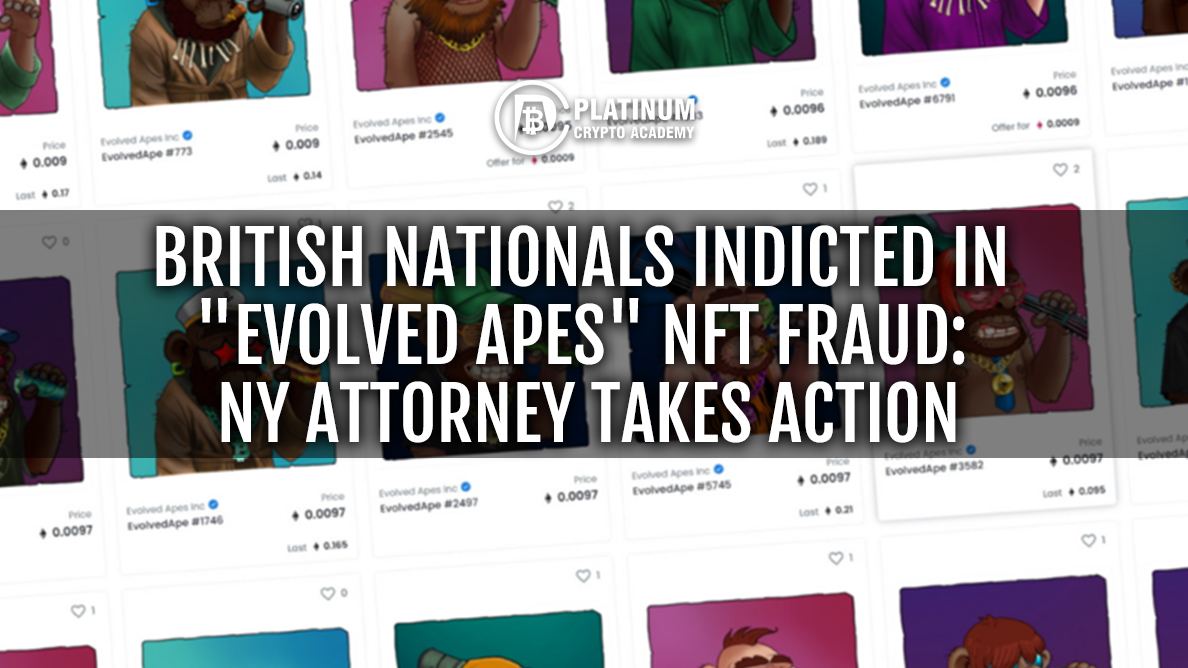In an era where digital art and blockchain technology are rapidly evolving, the world of Non-Fungible Tokens (NFTs) has emerged as a revolutionary frontier. However, with new opportunities come new forms of deception and fraud. Recently, the Southern District of New York’s U.S. Attorney’s Office brought charges against three British nationals for their involvement in a significant NFT scam. The defendants, Mohamed-Amin Atcha, Mohamed Rilaz Waleedh, and Daood Hassan, are accused of orchestrating a “rug pull” scheme under the guise of the “Evolved Apes” NFT project. This blog delves into the details of the scam, the charges, and the broader implications for the NFT community.
The “Evolved Apes” NFT Scam: A Closer Look
The “Evolved Apes” project was marketed as an ambitious and promising venture, with the centerpiece being a series of 10,000 unique digital ape characters. The developers claimed that these NFTs would not only serve as collectibles but also be integral to an upcoming video game. This game, accessible only to Evolved Ape NFT holders, was supposed to feature these characters in a fighting arena, thus adding utility and value to the tokens.
However, the promises made by the developers were nothing more than a smokescreen. According to the U.S. Attorney’s Office, the trio of Atcha, Waleedh, and Hassan engaged in a conspiracy to inflate the value of these NFTs based on false pretenses. After successfully selling the tokens, they swiftly transferred the funds out and abandoned the project, leaving investors in the lurch.
The Financial Impact and Legal Charges
The fraudulent activities of the defendants had a substantial financial impact. It is alleged that nearly 800 Ether (ETH), valued at approximately $2.7 million at the time, was siphoned off in the scam. On the very first day of sales, the trio amassed over $2 million, reflecting the high level of interest and investment in the project.
The Southern District of New York has charged the defendants with conspiracy to commit wire fraud and money laundering. These charges are severe, each carrying a potential maximum sentence of 20 years in prison. The legal repercussions underscore the gravity of their actions and serve as a stern warning to others contemplating similar schemes.
Deceptive Practices and the Collapse of the Project
The fraudulent nature of the “Evolved Apes” project became evident shortly after its launch. Despite the detailed roadmap and the phased rollout plan outlined on their website, the project quickly unraveled. The website was abruptly taken down less than two weeks after the initial sales, on October 5, 2021. This sudden disappearance left investors without any recourse and exposed the project as a scam.
An intriguing aspect of the case involves Mohamed Rilaz Waleedh’s attempt to access the stolen funds. After transferring the Ether to a personal wallet, he faced a blockade from the cryptocurrency exchange, which sought to investigate the source of the funds. Waleedh managed to convince the exchange to lift the block by falsely claiming he needed the money for his grandmother’s cancer treatment. This deceitful maneuver highlights the lengths to which the defendants went to secure their ill-gotten gains.
Accountability and Implications for the NFT Market
The charges brought against Atcha, Waleedh, and Hassan are a crucial step towards accountability in the rapidly growing and often volatile NFT market. U.S. Attorney Damian Williams emphasized that while digital art and NFTs are new, the fundamental rules of legality and honesty remain unchanged. “Making false promises for money is illegal,” Williams stated, reinforcing that NFT fraud will not be tolerated.
FBI Assistant Director James Smith echoed this sentiment, pointing out the breach of trust inherent in such scams. The failure to deliver on promises not only damages the integrity of the business but also violates the implicit trust that buyers place in sellers when purchasing NFTs. This case serves as a reminder that transparency and reliability are paramount in maintaining the health and growth of the NFT ecosystem.
The Future of NFTs and Investor Vigilance
The “Evolved Apes” scam is a stark reminder of the risks associated with the burgeoning NFT market. As the popularity and financial stakes of NFTs continue to rise, so too does the potential for fraud. Investors must exercise caution and conduct thorough due diligence before committing their funds to any project. This includes scrutinizing the project’s team, their track record, and the feasibility of their claims.
For the NFT market to thrive, it is essential that both creators and investors adhere to ethical standards. Regulatory bodies are also likely to increase their scrutiny of the space to prevent and prosecute fraudulent activities. The enforcement actions taken by the U.S. Attorney’s Office in this case demonstrate a commitment to protecting investors and maintaining the integrity of the market.
Conclusion
The indictment of Mohamed-Amin Atcha, Mohamed Rilaz Waleedh, and Daood Hassan for their roles in the “Evolved Apes” NFT scam marks a significant moment in the ongoing evolution of digital art and blockchain technology. It highlights the importance of accountability and the need for vigilance in the NFT market. As this space continues to develop, both investors and creators must prioritize transparency, honesty, and ethical conduct to ensure its sustainable growth and success.
The story of the “Evolved Apes” serves as a cautionary tale, but also as a call to action for stronger regulatory frameworks and increased awareness among participants. Only through collective efforts can the promise of NFTs be fully realized, free from the shadows of fraud and deception.



